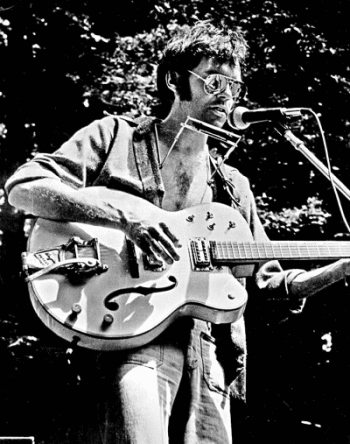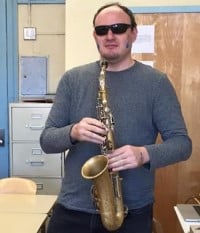.
.
“Not Just Another Damn Song on the Radio,” a short story by Craig Fishbane, was a short-listed entry in our recently concluded 63rd Short Fiction Contest, and is published with the consent of the author.
.
.
___
.
.
Warner/Reprise, Public domain, via Wikimedia Commons

Neil Young, sometime in the 1970s
.
___
.
Not Just Another Damn Song on the Radio
By Craig Fishbane
.
…..Neil Young stumbled off the stage more exhausted than usual. It had been a trying gig, watching Danny Whitten teeter from chord to chord on a heroin-fueled high-wire act that just seemed to get more perilous as the night wore on. It was fine that Danny blew some chords—everyone blew chords in this band. That was what made Crazy Horse special in the first place. If Neil wanted every note pure and perfect, he could have stuck with Crosby, Stills, and Nash. But what would have been the point of that? It was like playing a benediction for your own immaculate coffin.
….. No, he didn’t need Whitten to be perfect. He wanted the music to sound like those ruined cities the tour bus passed through every day. He wanted the guitar parts to sound like crumbling buildings and empty parking lots, the rush of air through broken windows. He wanted the sound of Danny Whitten but had no idea how much longer Whitten would be able to sound like himself.
….. Young waved off the offers of grass and pills as he walked the narrow hallway to the dressing rooms, proceeding along the patchouli gauntlet of one sycophantic smile after the next, like an army of Cheshire Cats waiting to get Alice hooked. He knew that sooner or later, one of them would succeed. Someone had the shit that would let Neil sleep tonight, when he finally decided to shut down. Sleep was the only time when the world didn’t look like a dream, the lysergic miasma of passing from one identical door to the next until you finally crossed the threshold and found another man in your spot on a beat-up sofa, a scowling figure fingering the keys to a brass trumpet on his lap.
.
….. Miles Davis didn’t make it a habit to linger after shows, but he was in a reflective mood tonight. His philosophy ever since he had apprenticed for Charlie Parker was to play, get paid and get the fuck out. There was no upside to idling around. Hanging out with fans was sure to be a drag, and spending time with the club owners would be even worse. There was always someplace better to go than where you were.
…..That’s why the music had changed so many times, why he had changed so many times. That was the reason he consented to play this bill in the first place, the opening act for some burnt-out lumberjack with an electric guitar. His manager had insisted that if he wanted to expand his audience, if he wanted to connect with a new generation, then he was going to have to open for all these white hippie jam bands and act like it didn’t bother him too much.
….. Davis had been surprised to find himself thinking about Charlie Parker when Young barged into the room. He didn’t like thinking about the old days. As far as he was concerned, that was what made you old. But he couldn’t help but wonder what Bird would have made of this scene, the girls in mini-skirts and the boys with long hair. He probably would have made some wry comments about those kids in the hallway, speaking in that half-assed British accent he used when explaining a saxophone concept to someone who wasn’t as hip to the music as he was. Then he would have scored some dope.
…..It had been twenty-five years since those first recording sessions with Parker, where Miles had wrestled with chord sequences as huge and complex as ziggurats rotting in the desert. Now he was trying to get over on a crowd that wouldn’t know a flattened fifth if it strangled them to death, preferably with a steel guitar string.
…..Davis never would have opened for Neil Young if his manager hadn’t played him some choice cuts over the phone. The motherfucker played guitar like half of his fingers had once been paralyzed but there was something he did with those chords, something so crude and ugly that it was kind of beautiful. Young couldn’t have played on Round Midnight or My Funny Valentine but he knew how to play, how to make music that didn’t sound like just another damn song on the radio.
…..It was the kind of electric guitar Miles wanted to add to his mix. He had been planning to use Hendrix but it was too late for that now. Maybe a wonky Canadian was just what he needed for his next new thing. Davis adjusted his shirt collar and watched Young’s lips gesture in the direction of speech. Words weren’t coming from his mouth as he gawked at Miles’ trumpet. Neil wanted to ask about that melody he had heard at the end of Davis’s set, that furious piercing arpeggio that contained everything Young wanted to put into his lyrics, a nostalgia so haunted by despair it could chase away the ghosts of time.
…..Young heard someone shouting in the hallway. Something about Danny. He must have passed out again. Or worse. Neil sighed through parted lips and, before he let go of the knob, he considered how it might sound if his guitar licks merged with a probing, petulant trumpet. Either those riffs would meld into a bleak new brand of tortured beauty, or the lonely echoes would expand exponentially, leaving everyone stranded on the dance floor. There was no way of knowing unless they tried it. Another scream from the hallway and all Young could do was shake his head as he retreated across the threshold and Davis lowered his horn back into its case.
.
Neil Young and Miles Davis shared a bill at the Fillmore East in New York City on March 6th and 7th of 1970, the only time they ever played the same concert together. There is no record of them meeting backstage.
.
.
___
.
.

Craig Fishbane is the author of the short fiction collection On the Proper Role of Desire. His work has also appeared in New World Writing, the New York Quarterly, Hobart, The Fabulist, Lunch Ticket, the MacGuffin and The Nervous Breakdown.
.
.
Listen to the 1969 recording of Neil Young with Crazy Horse performing “Everybody Knows This is Nowhere.” Danny Whitten – who died in November of 1972 from what Rolling Stone magazine reported to be a Methaqualone (Quaalude) overdose – shares vocals with Young). [Reprise]
.
.
___
.
.
Click here to read “Company,” Anastasia Jill’s winning story in the 63rd Jerry Jazz Musician Short Fiction Contest
Click here for details about the upcoming 64th Jerry Jazz Musician Short Fiction Contest
Click here to subscribe to the Jerry Jazz Musician quarterly newsletter (it’s free)
Click here to help support the continuing publication of Jerry Jazz Musician, and to keep it commercial and ad-free (thank you!)
.
.
___
.
.
Jerry Jazz Musician…human produced (and AI-free) since 1999
.
.
.









































Bravo! Love Neil. Thanks for a behind the scenes possible encounter.